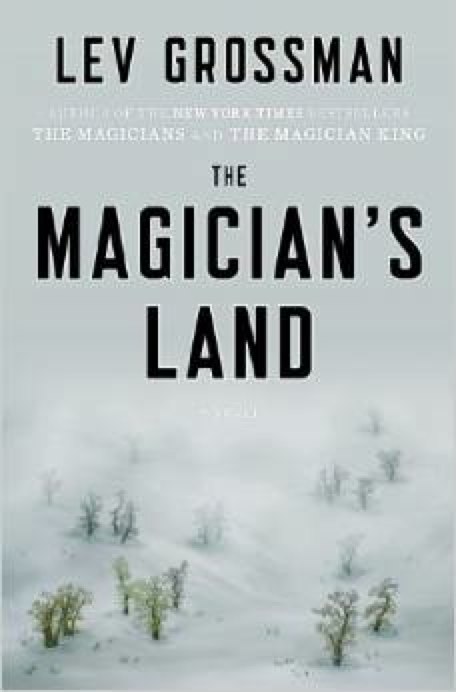The Magician’s Land
The conclusion of the promising series begun with The Magicians and The Magician King, this completes Grossman’s exploration of fantasy in the mode of high realism. We thought perhaps this would be Julia’s book, but it belongs instead to Alice, our lost lover who gave up her life (and indeed her humanity) in the first volume to save her former lover, young Quentin Coldwater, and incidentally to save Fillory, the land of faerie he loves.
This trilogy is a fine, engaging, and memorable story. It’s a single work; the novels stand alone, more or less, but the overall story is the entire point. Grossman’s trilogy is, of course, a response to Harry Potter, and its argument is well worth hearing.
Grossman’s land of faerie, Fillory, is also a response and a tribute to Narnia, but where heroic fantasy tries to evoke awe and wonder, Grossman strives to retain realism even when things are happening that simply don’t take place in the fields we know. This could work, but Grossman subverts his world even as he builds it. Fillory is filled with myriad marvelous beasts, wonders so numerous that no one cares very much about anything because another marvel is bound to crop up soon. This had a promising effect back in The Magician, since it reflected the louche, feckless, but engaging protagonists who had so recently graduated from Brakebills and who were engaged in discovering all sorts of marvels: whiskey, wine, sex, and mastery. But this is a long journey, the marvels tend to blend together, and the relentless cynicism of the your narrator necessarily undercuts the sense of wonder that is the whole point of faerie.
There’s much talk of gods in this conclusion of Fillory, but these gods don’t get things done. You could say the same for Narnia, of course, but emulating flaws is a limited amusement. There’s quite a lot of fighting in Fillory but, in retrospect, almost every fight is merely a question of discovering which side began with an impossible advantage. Contrast Tolkien, for example, where actual fights are few and where the question is almost never who is strongest but rather what winning actually means. Weathertop, Moria, Helm’s Deep, Pelenor Fields, or The Last Battle: it’s never a question of unstoppable force, but rather the murkier matter of knowing what victory might really be.
Fillory is a story within the story, a construction that becomes explicit in The Magician’s Land. Internal stories are sometimes well wrought (Possession) but often they are sometimes deliberately bad (Hamlet). The technical issues that mar Fillory are certainly evident to Grossman and so must be intentional; I'd long assumed that Fillory was either a façade or a sham, but it is what it is; we’re so firmly realist that even our fantasy world is pretty shabby.
When seven years of epic struggle and the release of untold magic energies (at terrific personal risk) restore lost Alice to life, all she can manage is the request for a glass of Scotch with a single large ice cube. The Magician pours his neat. Neither really wants the whiskey.
